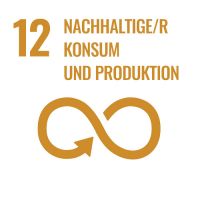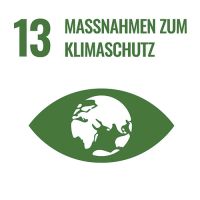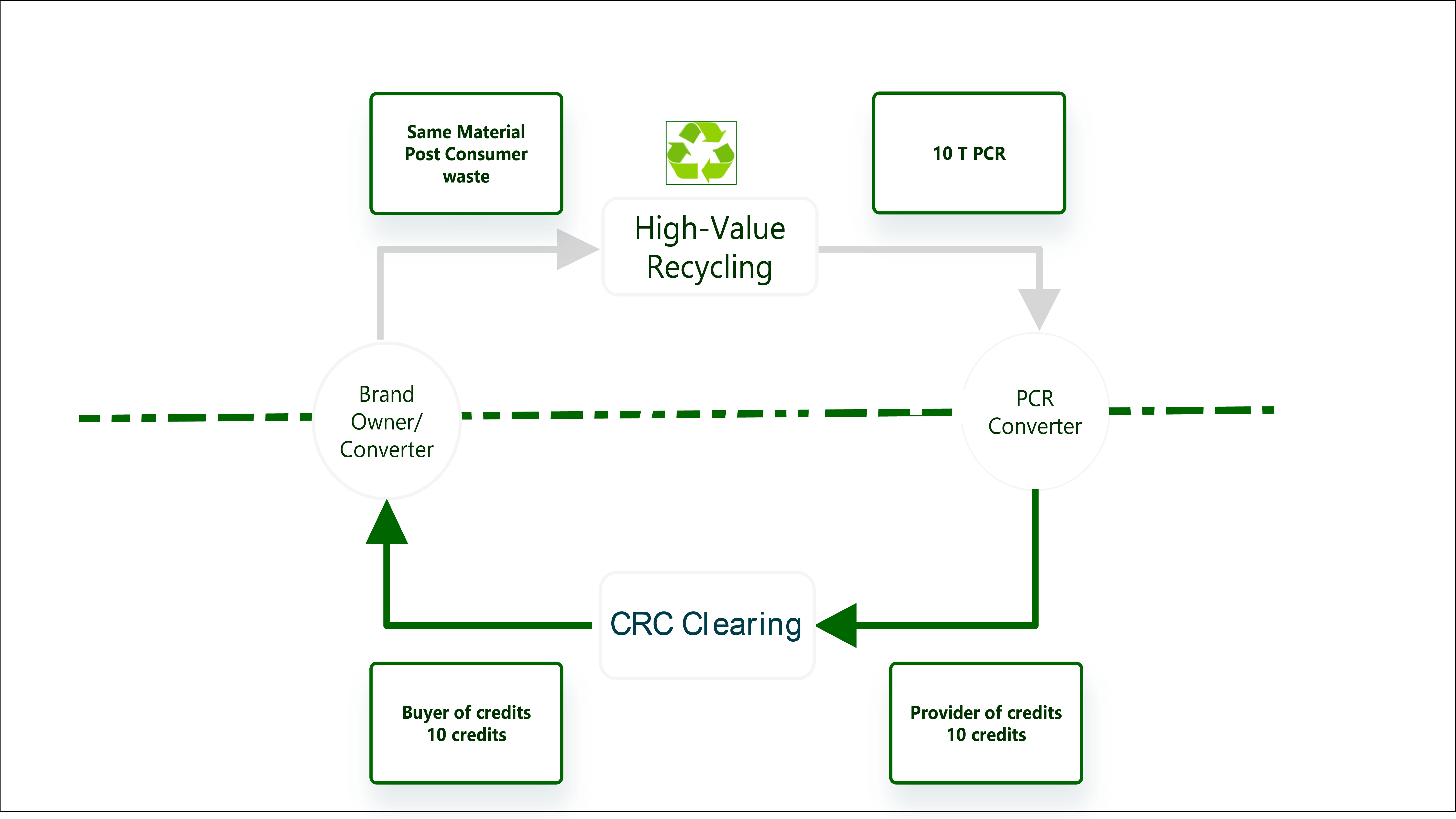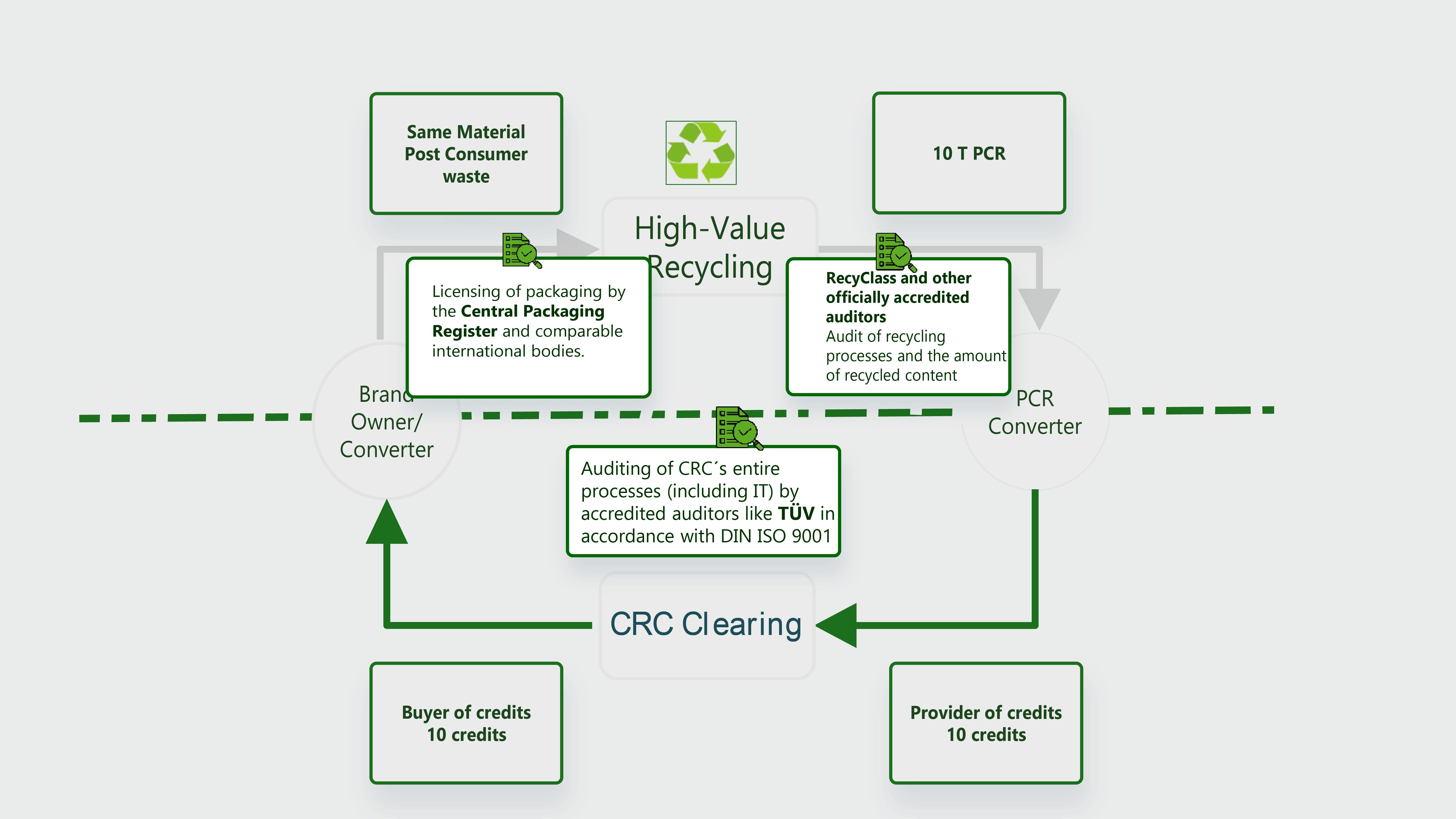Ready for the future:
Prove the use of recycled materials with credits
The European Packaging Ordinance (PPWR) makes it mandatory: the recycling obligation for plastic packaging comes into force in 2030 – we’ll get you ready:
With CRC certification – transparent, safe, compliant

Why action must be taken now:
Current risks and challenges
Recyclate crisis: High-quality materials are becoming scarce.
By 2030, companies will have to increase their use of post-consumer recyclate fivefold. The market is already under pressure: High-quality recyclate is increasingly becoming a bottleneck – also due to the growing demand from other industries.
Experts predict a recyclate shortage of up to 3.5 million tonnes in Europe (Conversio 2024)


Lack of quality in recyclates: A problem with consequences
Although the recycling rate in private final consumption in Germany is 67%, only 7% of high-quality post-consumer recyclates (PCR) are reused (Conversio 2024).
It is clear that the focus is on quantity rather than quality.
Is this a threat? Marketing bans could shake the industry
Packaging that does not fulfil the legal requirements faces marketing bans. Medium-sized companies are particularly affected, as they are either unable to obtain the required recyclate qualities on the open market or can only do so at significantly less favourable conditions.


Technical difficulties
Mechanically recycled polyolefins suffer from extreme fluctuations in quality – from a strong odour and dark colour to the formation of specks. This inconsistency makes industrial processing on modern packaging machines impossible.
Solution
How to conserve resources and save CO2!
Become part of the circular economy for plastics
Do you market plastic packaging based on the polymers PP, PO, LDPE, HDPE, PET or PS or do you already use such recyclates in your products?
Then you can participate, become active now!



How to conserve resources and save CO2!
Become part of the circular economy for plastics
Do you market plastic packaging based on the polymers PP, PO, LDPE, HDPE, PET or PS or do you already use such recyclates in your products?
Then you can participate, become active now!

Our mission
We strengthen the use of recyclates throughout the value chain and provide participating companies with a tool to meet their climate protection obligations.
To this end, we bring together stakeholders ranging from brand owners with recyclable packaging to manufacturers of durable goods with a high recycled content – with the aim of creating a holistic material flow.
A complete record of all process levels ensures the “best possible” contribution of each company involved and enables the expansion of the recyclate market!





We support the goals of the UN
ERDF-Funding Project:
Digital Platform for Trading Recycled Material Certificates
Certified Recycled Content (CRC) GmbH, in collaboration with the Wuppertal Institute, is developing a digital platform that enables the trading of recycled material certificates. Supported by extensive preparatory work and interdisciplinary expertise from industry and research, the platform aims to establish transparent standards and make the origin and use of recycled materials traceable. The project is funded by the European Regional Development Fund (ERDF).
Project Goals:
Promotion of recycled material usage
Reduction of costs for businesses
Reduction of CO₂ emissions
With the support of the ERDF and the expertise of the Wuppertal Institute, we are creating a platform that not only promotes the use of high-quality recycled plastics but also ushers in a new era for the recycling industry.

Work Steps of the ERDF-Funded Project:
-
Platform Development:
Prototype with at least 100 companies, focusing on transparency, data security, and adaptability for additional material flows. -
Potential Analysis:
Assessing available quantities and evaluating environmental impact. -
External Review of the Certificate Trading Platform:
Preventing misuse, ensuring transparency, and avoiding greenwashing. -
Scientific Utilization and Transfer:
Publications, master’s theses, and workshops to disseminate results and explore transferability to other certification systems.
Together for a Sustainable Future
Positive effects
CRC GmbH’s objective is to promote the circularity of plastic packaging in the sense of UN SDG No. 17 – “Partnership to Accomplish the Goals” – through cooperation among partners along the entire value chain and to contribute significantly to decarbonization.
The increased amount of recycled material in the loop replaces an equivalent amount of fossil raw materials and thus contributes to a significant CO2 reduction.
Replacing 1kg of fossil virgin material with 1kg of recycled material saves approx.:
1.5 – 2.5 kg CO2!
The use of recycled material is climate protection!
The sale of the credit offers additional sales potential thanks to the reimbursement of proportionally calculated recyclate input quantities, which makes the use of recyclate more profitable. Investment security is increased.
The market for recycled material stabilizes.
The price of recycled material is decoupled from the price of virgin material.
Participation in the certificate system is only possible if the plastic packaging of a brand owner is demonstrably recycled to a high quality, i.e. used as a substitute for virgin material in typical material applications. This requirement leads to a shortage of certificates, which can only be remedied by increasing the quantity of high-quality (in the sense of virgin material-replacing) recyclates. This creates an incentive to redesign previously non-recyclable packaging in the direction of significantly improved recyclability. The resulting improvement in recyclate quality opens up additional market potential for their use.
credits are only traded for plastic volumes (polymers: PP, PO, PS, LDPE, HDPE, PET) that can be verifiably used in products in terms of quantity and polymer identity. Accredited auditors ensure an actual flow of volumes from buyers and sellers of certifiable plastic products
Participation in the CRC certification system requires the use of recyclable products in accordance with internationally recognized standards. The certification is renewed annually. Legislative changes are taken into account so that continuous optimization in the Design for Recycling is guaranteed.
How it works
The principle is simple. A recyclate user who uses more post-consumer recyclate (PCR) in high-value applications than required by law can generate the corresponding amount of credits via the CRC platform. These credits can be obtained by manufacturers or distributors of plastic packaging that do not fulfil the legal requirements for the use of recyclates.
A prerequisite for the purchase of certificates is that the packaging for which the certificates are to be credited is recycled to a high standard (replacement of virgin material in high-quality applications).
The credit purchaser can only purchase credits for plastic quantities (PP, PO, PS, LDPE, HDPE, PET) that are polymer-identical to the products placed on the market!

The certified PCR quantities may no longer be used by the seller for offsetting against the statutory recycled content quotas. This avoids double counting or a mathematical conflict with the legal requirements.
See example below:

Seamless auditing and verification in the cycle:
100% transparency is ensured by auditing the entire process without gaps. It is guaranteed that audited proof is available confirming that the certificate purchaser places packaging on the market that is reused as post-consumer recyclates after high-quality recycling. Furthermore, it is ensured that the certificates purchased are backed by corresponding quantities of high-quality post-consumer recycled material (PCR), which are validated by publicly appointed and sworn experts. CRC as a system head and its entire processes are audited in the third stage.

Who can participate
in the
credit system?
Credit purchaser:
Brand owners/marketers of plastic packaging that cannot physically use recyclate due to legal regulations or certain packaging properties have the opportunity to participate in the CRC credit system.
Credit provider:
Those Converters can become credit providers who already use recyclates for high-value applications. By selling the credits, they can tap new revenue potential, making the overall use of recyclates more profitable and increasing the share.
The use for high-value applications is ensured by certified auditors.
The material flow from post-consumer packaging via sorting, recyclers to converters and from there to high-quality applications is thus precisely verified via the volume flow verification of the Dual Systems and the respective auditors.
Requirements and obligations for the purchase/sale
The advantages at a glance
By fulfilling the listed requirements, CRC certificate trading makes a significant contribution to resource conservation and decarbonization:
Resource conservation
Reduction of CO2
Increase in the amount of recycled material used
Increasing the efficiency of the entire recycling system
The team behind CRC
We combine expertise in high-quality recycling and flexible plastics processing

Dr. Dirk Textor
25+ years of experience in plastics recycling. Chairman of the plastics recycling section of bvse e.V. (German Association for Secondary Raw Materials and Recycling). Strong international and national network.

Ansgar Schonlau
Ansgar Schonlau is an international packaging expert with over 25 years of experience in the plastics industry. He has held various sales and management positions, always with the aim of developing sustainable and cost-effective products and processes. Since 2018, Ansgar Schonlau has been the owner of the highly innovative packaging manufacturer Maag.

Dr. Michael O.E. Scriba
Dr. Michael O.E. Scriba is considered a pioneer of the circular economy for packaging due to his pioneering role in establishing the Green Dot in Germany and the successful restructuring of a plastics recycling company, the mtm plastics group, into one of the largest polyolefin recyclers in Europe. As chairman and advisor to several important industry organizations and as a shareholder of a recycler, he actively shapes and advises the value chain in plastics recycling.
Documents for download
In-depth insights into CRC and current ordinances and regulations on the circular economy
Download the detailed CRC dossier, the Packaging and Packaging Waste Regulation (PPWR), the National Circular Economy Strategy (NKWS) and the Packaging Act as a PDF now.
The documents give you an in-depth insight into the current challenges of the circular economy and our certification solution. Get well-founded information to make sustainable decisions and better understand legal requirements

Contact
Do you place recyclable packaging of the polymer type: PP, LDPE, HDPE, PO, PS or PET on the market or do you manufacture products of the same polymer? Then write to us. We will be happy to check whether you are eligible to participate in our certification.

